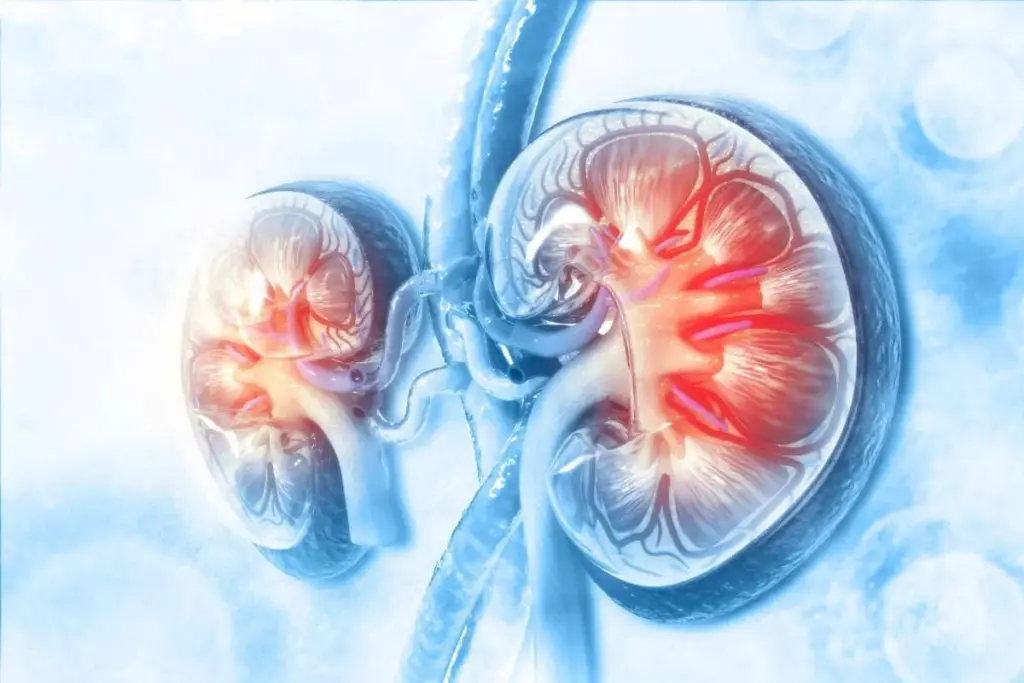
Are you or a loved one feeling strange headaches, mood swings, or constant anxiety? These signs can be scary and might point to a brain tumor. Facing a possible diagnosis can be tough. It’s key to tackle the emotional and brain health sides of this issue.
Between 17-31 percent of people with a brain tumor deal with serious anxiety. Tumors in areas like the cerebellum can make it hard to move, adding to mental health struggles. At Liv Hospital, we offer full care for both brain and emotional health.
Key Takeaways
- Spotting the signs and symptoms of brain tumor anxiety is vital for early help.
- Brain tumor signs can include many physical and emotional issues.
- Anxiety often goes hand-in-hand with brain cancer.
- Knowing how brain tumors and anxiety are linked helps in managing it.
- Liv Hospital focuses on patient care for both brain and emotional health.
Understanding the Connection Between Brain Tumors and Anxiety
The link between brain tumors and anxiety is complex. Research shows that brain tumor patients often feel more anxious. This anxiety comes from the tumor’s physical effects and the emotional weight of the diagnosis.
The Prevalence of Anxiety in Brain Tumor Patients
Anxiety is common among brain tumor patients. It’s more common than in the general public. Recent studies show up to 50% of brain tumor patients have anxiety symptoms. This highlights the need for mental health support in their care.
Uncertainty and fear from the diagnosis play a big role. So does the tumor’s effect on mood and emotional control areas in the brain.
How Brain Tumors Can Directly Cause Anxiety
Brain tumors can directly cause anxiety by affecting certain brain areas. Tumors in the amygdala, prefrontal cortex, or pituitary gland can lead to anxiety and mood issues. The amygdala is key in emotion processing, and tumors there can make anxiety worse.
Physiological changes from the tumor, like changes in neurotransmitters, also increase anxiety. Knowing these effects helps in creating better treatments for anxiety in brain tumor patients.
Healthcare providers can offer better care by understanding the complex relationship between brain tumors and anxiety. They can address both physical and emotional needs of patients.
The Science Behind Brain Cancer Anxiety
It’s important to understand the science behind brain cancer anxiety. This knowledge helps in managing anxiety effectively. We are learning how brain tumors affect anxiety and mood, which is key for caring for patients.
Brain Regions Affected by Tumors That Influence Mood
Brain tumors can change mood and anxiety levels by affecting different brain areas. Tumors in the limbic system, which controls emotions, can greatly increase anxiety. The location of a tumor is a big factor in anxiety symptoms.
Tumors in the amygdala can make anxiety worse. The frontal lobe is important for mood, and tumors there can cause anxiety and emotional issues.
- Tumors in the limbic system can cause emotional disturbances.
- The amygdala’s role in processing emotions can be compromised by tumors.
- Mood regulation can be affected by tumors in the frontal lobe.
Neurochemical Changes and Their Impact on Anxiety Levels
Brain tumors can also change neurochemicals, affecting anxiety. The tumor can upset the balance of neurotransmitters like serotonin and dopamine, which are important for mood and anxiety.
Research shows that brain tumor patients often see changes in their neurochemicals, leading to more anxiety. Treating these changes is a big part of managing anxiety in these patients.
- Neurotransmitter imbalance can lead to increased anxiety.
- Serotonin and dopamine play a big role in mood.
- Managing neurochemical changes can help reduce anxiety symptoms.
Understanding brain cancer anxiety helps healthcare providers create better strategies for managing it. They can tackle both the psychological and neurochemical sides of anxiety.
12 Key Signs That May Indicate a Brain Tumor Instead of Just Anxiety
Anxiety can cause many symptoms, but some signs might mean a brain tumor. It’s important to know these signs to get medical help fast.
Persistent or Unusual Headaches
Headaches are common with anxiety, but unusual ones could mean a brain tumor. Headaches that keep coming back or get worse with nausea or vomiting need a doctor’s check.
Vision Problems and Changes
Vision issues can signal a brain tumor, if they’re sudden or severe. Blurred vision, double vision, or losing peripheral vision are signs to see a doctor.
Cognitive Difficulties and Memory Issues
Both anxiety and brain tumors can cause thinking and memory problems. But serious or getting worse thinking issues might mean a brain tumor.
Balance and Coordination Problems
Balance and coordination issues could be a brain tumor sign, if new or getting worse. Walking problems, stumbling, or losing balance need a doctor’s check.
Knowing these signs helps get medical help when needed. If you have these symptoms, see a healthcare professional for a proper check-up.
Distinguishing Between Brain Tumor Symptoms and Anxiety Disorders
It’s hard to tell if someone has a brain tumor or an anxiety disorder because their symptoms can look the same. We’ll look at how to tell them apart and what makes each one unique.
Overlapping Symptoms That Cause Confusion
Brain tumors and anxiety can both cause headaches, dizziness, and trouble thinking. For example, someone with a brain tumor might feel anxious because of the tumor. This makes it tough to figure out what’s going on.
Anxiety can also show up in physical ways, like shaking, feeling sick, or having trouble focusing. These symptoms can be mistaken for signs of a brain tumor.
Key Differentiating Factors
Even though symptoms can look the same, there are key differences. Symptoms that keep getting worse, like getting weaker, seeing things differently, or having seizures, usually mean a brain tumor. Anxiety, on the other hand, can change a lot and is often linked to stress or certain things that upset a person.
| Symptom | Brain Tumor | Anxiety Disorder |
|---|---|---|
| Headaches | Persistent, worsening over time | Variable, often stress-related |
| Cognitive Difficulties | Progressive, noticeable decline | Fluctuating, related to anxiety levels |
| Seizures | Possible, with tumor growth | Not typical, unless from anxiety-induced hyperventilation |
Getting a correct diagnosis means looking closely at the symptoms, medical history, and test results. Knowing the differences between brain tumor symptoms and anxiety disorders is key to finding the right treatment.
Can a Brain Tumor Cause Depression?
Depression is a big worry for people with brain tumors. It affects their happiness and how well they do in treatment. The mix of the tumor’s physical effects and the emotional weight of the diagnosis can lead to mental health issues.
Living with a brain tumor is more than just physical symptoms. It also affects emotions and the mind of patients and their families.
Direct Physiological Causes
Brain tumors can change mood and emotional control in several ways. Tumors in emotional areas, like the limbic system, can mess with brain chemicals, causing sadness. The tumor’s presence can alter brain function, affecting mood, thinking, and feelings.
Also, the tumor can cause inflammation and other changes that might lead to depression. The way the tumor affects the brain can help explain why some people get depressed.
Reactive Depression Following Diagnosis
Getting a brain tumor diagnosis is very hard and can lead to depression. It can make people feel hopeless, scared about the future, and worried about treatment. Patients often find it hard to deal with the news, and it can feel too much to handle.
Treatment can make things worse, with changes in thinking and feeling, and uncertainty about the future. Support from doctors, family, and friends is key in helping patients get through this.
Studies on other cancers, like ovarian cancer, show that depression and anxiety are common. This shows the importance of caring for both the body and mind of patients.
When to Seek Medical Attention for Brain Tumor Concerns
It’s important to know the signs of a brain tumor early. If you have headaches, vision changes, or seizures, see a doctor. These could be signs of a serious issue.
Identifying Red Flags
Some symptoms need quick medical help. Look out for sudden vision or hearing changes. Also, unexplained nausea, balance issues, and seizures are red flags.
If you wonder “how do u know u have a brain tumor,” knowing these symptoms is key.
Preparing for Your Doctor’s Visit
Be ready to talk about your symptoms when you see a doctor. Tell them when your symptoms started, how long they last, and how bad they are. Also, mention what makes them better or worse.
This information helps your doctor figure out what to do next. It can also help spot signs of a brain tumor.
Q: Can a brain tumor cause anxiety?
A: Yes, a brain tumor can cause anxiety. It can affect the brain’s chemistry and function. This leads to anxiety symptoms. The tumor’s location and size can affect how severe the anxiety is.
Q: What are the common symptoms of a brain tumor?
A: Symptoms include persistent headaches, vision problems, and cognitive difficulties. Memory issues, balance problems, and seizures are also common. These symptoms can be similar to anxiety disorders, making diagnosis hard.
Q: How do I know if I have a brain tumor or anxiety disorder?
A: It’s hard to tell because symptoms overlap. If you have persistent headaches, vision changes, or seizures, see a doctor. They can do tests to find out what’s causing your symptoms.
Q: Can brain cancer cause depression?
A: Yes, brain cancer can lead to depression. The tumor’s physical effects and the emotional impact of a cancer diagnosis can cause it. The tumor can also change mood, leading to depression.
Q: What should I tell my doctor about my symptoms?
A: Tell your doctor about your symptoms in detail. Mention when they started, how long they last, and what makes them better or worse. This helps your doctor figure out what’s causing your symptoms and plan treatment.
Q: Are there any anxiety management techniques that can help with brain tumor anxiety?
A: Yes, techniques like mindfulness, cognitive behavioral therapy, and meditation can help. They can reduce stress and anxiety, improving your well-being.
Q: How can I cope with a brain cancer diagnosis?
A: Coping with a diagnosis is tough, but there are ways to help. Seek support from loved ones and join a support group. Mindfulness and meditation can also reduce stress and anxiety.
Q: What are the signs of a brain tumor in adults?
A: Signs include persistent headaches, vision problems, and cognitive difficulties. Memory issues, balance problems, and seizures are also signs. If you have these symptoms, get medical help right away.
Q: Can a brain tumor cause depression and anxiety?
A: Yes, a brain tumor can cause depression and anxiety. The tumor’s physical and emotional effects can lead to these mental health issues. Getting support from healthcare professionals and using stress-reducing techniques can help manage symptoms.
References
American Brain Tumor Association (ABTA). (n.d.). Brain tumor signs and symptoms. Retrieved from https://abt.org/about-brain-tumors/brain-tumor-diagnosis/brain-tumor-signs-symptoms
Brain Tumour Research. (n.d.). Information on brain tumour symptoms. Retrieved from https://braintumourresearch.org/pages/information-brain-tumour-symptoms
Macmillan Cancer Support. (2024). Psychological distress and quality of life in brain tumour patients (PMC ID: PMC11661549). Retrieved from https://pmc.ncbi.nlm.nih.gov/articles/PMC11661549
Moffitt Cancer Center. (n.d.). Mood changes and brain tumors. Retrieved from https://www.moffitt.org/cancers/brain-tumor/symptoms/mood-changes
The Brain Tumour Charity. (n.d.). Anxiety and brain tumour. Retrieved from https://www.thebraintumourcharity.org/living-with-a-brain-tumour/health-fitness/mental-health/anxiety-brain-tumour










